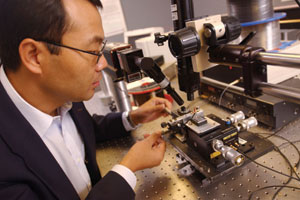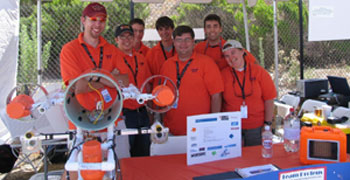
| The College of Engineering: Innovative past and present, bright future by Liz Crumbley |
| In 1872, when Addison Caldwell walked some 26 miles over the mountains between Craig County and Blacksburg to become the first student to enroll at the Virginia Agricultural and Mechanical College, prospects seemed rather bleak for the new land-grant venture. The school's first president, Charles Minor, noted that many of the 132 students that year had "the scantiest preparation" and that their lack of scholarship made it impossible for the five faculty members "to do all that is to be desired in the special technical courses."
Of course, President Minor couldn't have predicted that less than a century later, a Virginia Polytechnic Institute engineering alumnus, Chris Kraft (aerospace engineering '44), would become the chief architect of NASA's space flight program and Mission Control operations--or that Virginia Tech engineering undergraduates in the 21st century would design award-winning autonomous vehicles.
Today, Virginia Tech's College of Engineering hosts 7,500 students--the seventh largest engineering student body in the nation--and more than 300 full-time faculty. Through the generosity of alumni and other donors, the college boasts more than 50 named or chaired professorships, many endowed at more than $1 million each.
Generous alumni also have helped the college establish a unique "hands-on, minds-on" undergraduate program by establishing the Frith Freshman Engineering Design Lab, where freshmen learn basic engineering principles, and the Joseph F. Ware Jr. Advanced Engineering Laboratory, with its Klages Machine Shop, where undergraduates can design and construct their own projects for national competitions.
As a result of this hands-on approach, few engineering schools in the world match Virginia Tech's level of participation and success in student design-and-build projects. Two recent examples are the Grand Challenge team, which qualified to enter two vehicles in the $2 million autonomous vehicle race across the Mojave Desert and a team of undergraduates who designed a payload section that carried and deployed an atmospheric experiment into space aboard a sounding rocket launched by NASA.
Each year, individual engineering students also attract national attention for their academic strengths. Ashley White, who graduated in May 2005 with degrees in both materials science and engineering and music performance, won a British Marshall Scholarship for graduate study at Cambridge University in England and was named to USA Today’s All-USA College Academic First Team.
College of Engineering faculty members are recognized throughout the commonwealth and the nation for their excellence as teachers and researchers. During the past year, several received prestigious state and national honors:
- Richard Claus, the Lewis Hester Chair of Engineering, received a 2005 Outstanding Faculty Award from the State Council of Higher Education for Virginia;
- Ali Nayfeh, University Distinguished Professor of engineering science and mechanics (ESM), received the 2005 Lifetime Achievement in Science Award from the Science Museum of Virginia;
- Srinidhi Varadarajan of computer science was named one of the world's 100 Top Young Innovators by Technology Review;
|
 |
In a move recognized by the National Academy of Engineering for its leadership, the college recently transformed its engineering fundamentals program into the Department of Engineering Education. The catalyst for this innovation was the inclusion of computer science into the college during the university's restructuring. While engineering education will continue to train freshmen in fundamental principles, it also is developing graduate degree programs to prepare students to teach engineering or technology at any level, from kindergarten to college.
The college also has spearheaded a number of new collaborative programs aimed at bolstering the educational and research strengths of Virginia Tech:
|
- The National Institute of Aerospace, a research and graduate education venture established near the NASA Langley Research Center by a university consortium; and
- System X, the world's first supercomputer built with a cluster of 1,100 Power Mac G5s and the fastest terascale computer at an academic institution.
|
 In August, the College of Engineering welcomed a new dean, Richard C. Benson, who brings 16 years of academic administrative experience, including service as head of the Department of Mechanical and Nuclear Engineering at Pennsylvania State University. In August, the College of Engineering welcomed a new dean, Richard C. Benson, who brings 16 years of academic administrative experience, including service as head of the Department of Mechanical and Nuclear Engineering at Pennsylvania State University.
"In the course of my academic career," Benson says, "I've become an ardent supporter of the land-grant goals of openness, accessibility, and service through higher education. Few schools have met those goals with greater success than Virginia Tech. I'm excited by the prospect of leading the College of Engineering and building on the good work of my predecessors."
Today, he notes, Virginia Tech is celebrated for graduating many of the nation's best new engineers--young men and women who are skilled in the craft of engineering and also possess excellent skills in leadership and communication. "Virginia Tech is also renowned for its contributions in modern engineering research, from the nanoscopic to the colossal to the virtual. In the coming years, we will build upon these excellent traditions and measure our success through people."
Benson says he will work to provide an environment that encourages the members of the College of Engineering to grow as professionals "and to be willing to take on bold tasks. In such a risk-accepting environment, not every experiment will succeed. So be it. We'll move on to the next big challenge. For the many successes that do occur, we will celebrate the achievements and let the world know that a fertile environment for scholarship exists at Virginia Tech. Our future is indeed bright."
Liz Crumbley is the college communications manager for the College of Engineering.
|
|